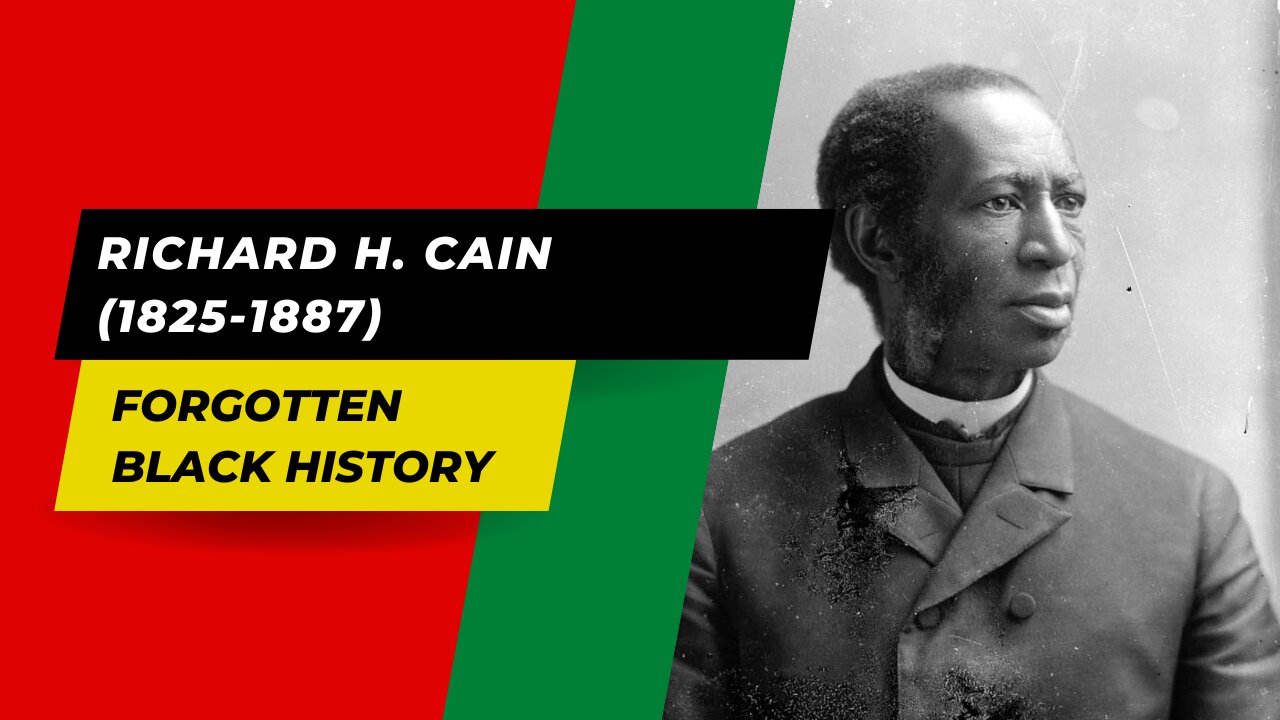Premium Only Content

RICHARD H. CAIN (1825-1887)
This video is brought to you by, Fiverr: https://go.fiverr.com/visit/?bta=500952&brand=fiverrhybrid
Fiverr Learn: https://go.fiverr.com/visit/?bta=500952&brand=fiverrlearn
Fiverr Business: https://go.fiverr.com/visit/?bta=500952&brand=fb
Become a Fiverr Affiliate: https://go.fiverr.com/visit/?bta=500952&brand=fiverraffiliates
Fiverr Workspace: https://go.fiverr.com/visit/?bta=500952&brand=workspace
Welcome to "Forgotten Black History". On this channel we talk about special places, events and people in Black History, This page serves as an index to the prominent figures featured throughout the Black History society. Black history is the story of African Americans in the United States and elsewhere. We want to celebrate, remind, and pay respect to not only African Americans but Black people of all races and backgrounds. We hope you subscribe to join the family, so we can grow a small community to help people of all races know just how special black people actually are in the world. Thank you for taking the time out to visit our channel. We hope you subscribe, if you hadn't already. We wish you peace and love, and for you to stay safe out there.
#BlackHistory #ForgottenBlackHistory #BlackPeople
Check out our Rumble page for exclusive videos: https://rumble.com/c/c-1788327
Richard Harvey Cain was born a free black in Greenbrier County, Virginia on April 12, 1825. In 1831 his parents moved to Gallipolis, Ohio where he attended school. Seventeen years later, in 1848, he joined the African Methodist Episcopal (AME) Church and became a minister in Muscatine, Iowa. Cain moved to South Carolina in 1865 to lead a Charleston AME church and soon became involved in local politics. In 1868, he was elected a member of the South Carolina State Constitutional Convention. Later in the year he was elected to the South Carolina State Senate, a post he held until 1870. Cain was editor and publisher of the South Carolina Leader which eventually became the Missionary Record.
In 1872, Richard Harvey Cain was elected to South Carolina’s at large seat in the U.S. House of Representatives. Cain served on the Agriculture Committee in the 43rd Congress. He is most remembered, however, for his support of a civil rights bill introduced into the House in 1870. Although the bill failed to be enacted, during the debate he spoke eloquently and passionately about his own experiences during a trip to the nation’s capital where he was denied first class accommodations on a train. By 1874, Cain’s at large seat was eliminated and he chose not so seek another office that year. He continued, however, to be actively involved in the South Carolina Republican Party and in 1876 he returned to Congress representing the 2nd district of South Carolina. Cain served one term and then returned to his ministerial duties in Charleston. In 1880 Cain was elected a Bishop in the A.M.E. Church. Soon afterwards he moved to Texas and became one of the founders of Paul Quinn College in Austin. Bishop Cain served as the college’s first president between 1880 and 1884. Three years later on January 18, 1887, Richard Harvey Cain died in Washington, D.C.
-
 18:17
18:17
Forgotten Black History
5 months agoJay-Z in Huge Trouble Alongside Diddy
1871 -
 LIVE
LIVE
STGKAMZZ
3 hours agoSUNDAY FUNDAY WIT KAMZ*WARZONE ACTION
95 watching -
 LIVE
LIVE
STXReaper
4 hours agoWarzone resurg
126 watching -
 LIVE
LIVE
Astral Doge Plays!
5 hours agoOblivion Remastered ~LIVE!~ Blood of the Devines
99 watching -
 1:41:23
1:41:23
xBuRnTx
4 hours agoLIVE - Day 18 of Creator Program
12.9K2 -
 8:14
8:14
The Art of Improvement
3 days ago10 Difficult Skills that Pay Off Forever
24.1K6 -
 1:11
1:11
Damon Imani
20 hours agoThe View Got TORCHED by Damon for COVERING UP Biden’s Decline!
27.1K16 -
 13:53
13:53
Professor Gerdes Explains #Ukraine
6 hours ago273 Drones DEVASTATE as War Tech Gets DEADLY!
17.3K13 -
 28:53
28:53
Degenerate Jay
19 hours ago $1.13 earnedWhy Pokemon's Palworld Lawsuit Is Hypocritical
24K4 -
 9:20
9:20
ariellescarcella
10 days agoBased Lesbian Reacts To Woke TikToks
16.2K13